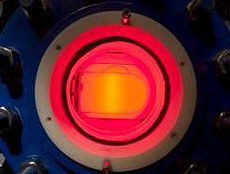October workshop to shape the future of U.S. detectors
 |
| Attendees at the upcoming Workshop on Detector R&D will work to create a national detector program. |
Early in October, scientists from across the country will gather at Fermilab to put their heads together. They'll work to dream up future detector technologies and start to develop a national detector R&D program.
The Workshop on Detector R&D will take place Oct. 7-9 at Fermilab. Registration is now open. There is a $10 registration fee.
The idea for this workshop came from a DOE review of detector R&D carried out at five national laboratories with a particle physics focus: Berkeley, SLAC, Fermilab, Brookhaven and Argonne. DOE recommended that the national laboratories develop a national program. The American Physical Society's Division of Particles and Fields joined as a co-sponsor.
Workshop co-chairs Marcel Demarteau and Chip Brock, who also chairs the DPF, are eager to see the entire scientific community engage in this discussion.
"A workshop of this nature has never been done before," Demarteau said. "This gives us a chance to bring the laboratory and university community together and learn about what others are working on."
University and laboratory attendees will get the opportunity to identify promising detector R&D areas, current challenges and the future needs of all stakeholders. Attendees will discuss the future of detector R&D in the U.S., as it relates to national particle physics, astrophysics and other related areas of science.
"I believe that this workshop topic will become increasingly important," Demarteau said. "This workshop will offer an opportunity to be creative and form innovative ideas for new detector technologies."
Demarteau explained that the field needs new, transformative technologies. It has reached a point where scientists can no longer scale current technologies due to cost and space constraints and experiment complexity, he said.
The workshop is also a way for the national laboratories to involve the next generation of scientists.
"Collaboration among laboratory scientists and university faculty, post docs and students has long taken place in high-energy physics," Brock said. "The workshop will help us to envision how to grow this relationship."
While the program's focus is on the future of U.S. detector technology, Brock and Demarteau welcome input from international colleagues.
Posters are now being accepted. A data transmission working group will also convene on Oct. 6.
-- Rhianna Wisniewski |